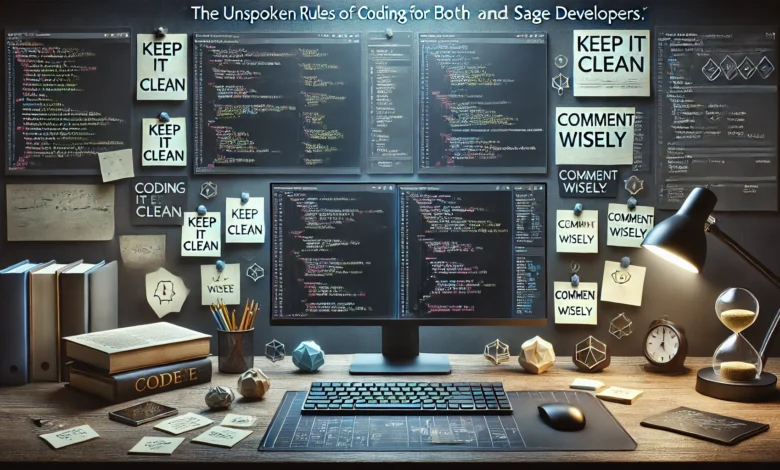The Unspoken Rules of Coding for Both Novice and Sage Developers

In the world of software development, the act of coding is as much an art as it is a science. Whether you’re just starting your coding journey or you’re a seasoned developer with years of experience, there are certain unspoken rules that govern the craft. These rules often go beyond syntax and logic, delving into the nuances of best practices, collaboration, and professional growth. In this article, we’ll explore the unspoken rules of coding for both novice and sage developers, providing insights that will resonate with programmers at every stage of their careers.
The Fundamentals for Novices
1. Understand the Basics Thoroughly
For novice developers, mastering the fundamentals is crucial. Concepts like variables, data structures, loops, and conditionals form the foundation of all programming languages. Skipping over these basics in favor of advanced topics can lead to confusion later.
2. Write Readable Code
Code readability is an often-overlooked aspect of programming for beginners. Always write code as if someone else will have to read it. Use meaningful variable names, add comments where necessary, and structure your code logically.
3. Don’t Fear Bugs—Learn From Them
Bugs and errors are inevitable in coding. Instead of fearing them, treat them as learning opportunities. Debugging is a skill that improves with practice, and each error helps you understand your code better.
4. Ask Questions
No question is too small or too simple. Whether you’re learning from a mentor, a peer, or an online forum, asking questions is essential to progress.
5. Focus on One Language at a Time
It’s tempting to try learning multiple languages at once, but depth is more important than breadth for beginners. Master one language before moving on to another.
Advanced Insights for Sage Developers
6. Never Stop Learning
For experienced developers, complacency can be a career killer. The tech landscape evolves rapidly, and staying updated with new tools, languages, and frameworks is essential to remain relevant.
7. Optimize, But Don’t Prematurely Optimize
Efficient code is important, but experienced developers understand the dangers of premature optimization. Focus on writing functional code first; you can optimize it later if performance becomes an issue.
8. Mentor and Share Knowledge
Sage developers often find themselves in leadership roles. Mentoring junior developers and sharing your knowledge not only helps them but also reinforces your own understanding.
9. Embrace Code Reviews
Even the most experienced programmers can benefit from a second pair of eyes. Code reviews improve code quality, catch overlooked bugs, and provide learning opportunities for everyone involved.
10. Balance Perfectionism With Deadlines
Experienced developers understand the balance between writing perfect code and meeting deadlines. Pragmatism often trumps perfectionism in real-world scenarios.
Universal Rules for All Developers
11. Write Tests
Testing is a vital part of the development process, regardless of your experience level. Unit tests, integration tests, and end-to-end tests ensure that your code behaves as expected.
12. Keep Your Code DRY (Don’t Repeat Yourself)
Repetition in code can lead to redundancy and potential errors. Strive to write modular, reusable code to improve maintainability.
13. Comment Wisely
Comments should explain the “why,” not the “what.” The code itself should be self-explanatory, while comments provide context or reasoning for non-obvious decisions.
14. Learn to Work in Teams
Collaboration is key in software development. Using tools like Git for version control, adhering to coding standards, and communicating effectively are crucial for successful teamwork.
15. Understand the Problem Before Coding
Jumping straight into coding without fully understanding the problem often leads to wasted effort. Take time to plan and break down the problem into manageable pieces before you start.
Avoiding Common Pitfalls
16. Don’t Rely Solely on Stack Overflow
While Stack Overflow is a fantastic resource, copying and pasting solutions without understanding them can lead to trouble. Use it as a guide, not a crutch.
17. Respect Deadlines, But Communicate Challenges
Unrealistic deadlines can lead to stress and burnout. If you’re unable to meet a deadline, communicate the challenges early and propose realistic alternatives.
18. Avoid Overengineering
Complex solutions aren’t always better. Strive for simplicity in your code, ensuring that it’s easy to understand, maintain, and debug.
19. Document Your Work
Documentation is invaluable for both current and future developers working on your code. Ensure that your documentation is clear, concise, and up-to-date.
20. Take Breaks
Coding can be mentally exhausting. Regular breaks not only prevent burnout but also improve your problem-solving abilities.
FAQs About The Unspoken Rules of Coding for Both Novice and Sage Developers
1. Why is code readability so important?
Readable code is easier to debug, maintain, and understand, especially when working in teams or revisiting old projects.
2. What should I focus on as a beginner?
Beginners should focus on mastering the fundamentals, writing clean code, and building small projects to apply their knowledge.
3. How can experienced developers stay relevant?
Staying relevant requires continuous learning, exploring new technologies, and staying engaged with the developer community.
4. What are some common mistakes to avoid in coding?
Common mistakes include neglecting testing, overcomplicating solutions, and skipping proper planning before coding.
5. How important is teamwork in software development?
Teamwork is critical in software development. Collaboration improves code quality, fosters innovation, and ensures projects are delivered on time.
Conclusion
The unspoken rules of coding for both novice and sage developers act as guiding principles for anyone in the programming world. For novices, these rules provide a roadmap to navigate the complexities of coding. For seasoned developers, they serve as reminders of the core values that ensure long-term success. By adhering to these rules, developers at all levels can build better software, foster healthier collaborations, and achieve personal and professional growth in their coding journey.
You may also read.
Bengals vs Baltimore Ravens Match Player Stats
How Old Would Selena Quintanilla Be in 2024
The Unspoken Rules of Coding for Both Novice and Sage Developers




